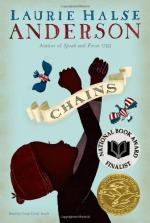
|
| Name: _________________________ | Period: ___________________ |
This test consists of 5 short answer questions, 10 short essay questions, and 1 (of 3) essay topics.
Short Answer Questions
1. How long is it before Isabel wakes after being branded?
2. What is the next thing Isabel remembers after leaving Colonel Regen's presence?
3. Why do Mary and Hannah argue?
4. Who asks to meet with Isabel?
5. What does Isabel shout about Madam Lockton?
Short Essay Questions
1. What does Isabel hear other slaves speaking of concerning the Loyalists?
2. To what horror does Isabel awaken one morning and how is Lady Seymour responding to the emergency?
3. How does Isabel learn about Curzon being in prison and about the conditions of the prison?
4. What happens when Madam Lockton arrives at Colonel Regen's camp?
5. Who comes to the window of the prison when Isabel calls for Curzon?
6. What happens when Isabel wakes the morning after eating the cookies and milk when she looks for Ruth?
7. What is Isabel startled to hear about Curzon?
8. What is Isabel's physical state when she awakes after returning from Colonel Regen's camp?
9. What is Isabel's life like after returning to the Lockton household?
10. What happens after Isabel returns with Mr. Lockton from the docks?
Essay Topics
Write an essay for ONE of the following topics:
Essay Topic 1
"Chains" belongs to the young teen historical fiction genre. Discuss the following:
1. Define the literary term "genre" and give several examples of three other genres in addition to the young teen historical fiction genre.
2. Discuss two reasons why it might be useful to label a text by genre and two reasons it might be disadvantageous to label a text by genre.
3. What do you think is the difference between a young teen historical fiction and a fantasy or mystery?
Essay Topic 2
Discuss one of the following:
1. Trace and analyze the theme of freedom in "Chains". Consider the following questions as you write: What characters are most concerned with freedom? Why? What are some symbols of freedom? Symbols of slavery? What characters are free? Why are they free?
2. Trace and analyze the theme of courage in "Chains". Which characters struggle with this issue? Why? Which characters seem to possess courage? Why?
3. Trace and analyze the theme of growing up and personal responsibility in "Chains". How does Isabel grow up? How does she try to get others to help her out of her situation? How does she finally end up taking responsibility for helping herself?
Essay Topic 3
Titles often play a vital role in making a person decide to read a particular book. Discuss the following:
1. Fully explain why you think "Chains" is titled as such. Do you think it is the best title for the book? Why or why not? Can you think of a better title? Why would you choose it?
2. How important is a title in influencing you to consider reading a book? Explain your answer.
3. Do you think a title needs to have direct relevance to a book's content? Explain your answer.
4. Have you ever read a book that when you finished, you do not understand the relevance of the title? Does it discourage you from "trusting" that particular author again?
|
This section contains 1,061 words (approx. 4 pages at 300 words per page) |

|




